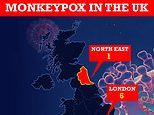UK monkeypox alert as health chiefs detect another FOUR monkeypox cases
UK monkeypox alert as health chiefs detect another FOUR cases of killer virus with NO links to Africa — as gay and bisexual men are urged to look out for ‘unusual rash’
New patients are gay or bisexual men from London with no travel links to Africa Two knew each other but not linked to early cases in sign of community spreadRare viral infection kills up to one in 10 sufferers and spreads via bodily fluid
<!–
<!–
<!–<!–
<!–
(function (src, d, tag){
var s = d.createElement(tag), prev = d.getElementsByTagName(tag)[0];
s.src = src;
prev.parentNode.insertBefore(s, prev);
}(“https://www.dailymail.co.uk/static/gunther/1.17.0/async_bundle–.js”, document, “script”));
<!–
DM.loadCSS(“https://www.dailymail.co.uk/static/gunther/gunther-2159/video_bundle–.css”);
<!–
Four more people have been diagnosed with monkeypox in the UK, bringing the total number of cases in the latest outbreak to seven.
All four new patients are gay or bisexual men who were infected in London and had no travel links to Africa, health chiefs have confirmed after MailOnline broke the news earlier today.
Two are known to each other but have no connection to any of the previous cases, in a sign the virus is spreading in the community for the first time.
Nurses and doctors are being advised to stay ‘alert’ to patients who present with a new rash.
Monkeypox is often mistaken for more common rash illnesses like chickenpox, measles, scabies and syphilis, which makes it difficult to diagnose early.
Dr Susan Hopkins, chief medical adviser at the UK Health Security Agency (UKHSA), said: ‘This is rare and unusual.
‘UKHSA is rapidly investigating the source of these infections because the evidence suggests that there may be transmission of the monkeypox virus in the community, spread by close contact.
‘We are particularly urging men who are gay and bisexual to be aware of any unusual rashes or lesions and to contact a sexual health service without delay.’
All seven UK cases have tested positive for the West African strain of the virus, which is believed to be milder than other versions.
Six of the seven cases were diagnosed in London while one is being treated at a specialist unit in Newcastle
Monkeypox is a rare viral infection which causes unusual rashes or lesions (shown in a handout provided by the Centers for Disease Control and Prevention (CDC) in the US
Medics in hazmat suits deep-clean a home in 2018 after the first ever monkeypox cases were diagnosed in the UK
Exactly how the new patients acquired the infection ‘remains under urgent investigation’, the UKHSA said.
The rare viral infection which kills up to one in ten of those infected but does not spread easily between people. It is transmitted via respiratory droplets during prolonged face-to-face contact or bodily fluids.
MailOnline has learned that at least one sexual health clinic in West London had started implementing tougher infection control measures this morning, including a one-metre social distancing rule in waiting rooms.
A source told MailOnline that some health teams were breaking ranks from national guidance and ‘perhaps putting in measures locally’.
The UKHSA announced on May 7 that a person who had recently travelled to Nigeria had contracted the infection.
It was believed they contracted the illness in Nigeria, where monkeypox is endemic, before travelling to the UK.
Two more cases were announced on Saturday, in two individuals who lived in the same household but were not linked to the initial case.
Nurses and doctors are being advised to stay ‘alert’ to patients who present with a new rash or scabby lesions (like above)
The first patient, a person who had recently travelled to Nigeria, was diagnosed on May 7. They were treated at the expert infectious disease unit at the Guy’s and St Thomas’ NHS Foundation Trust, London (pictured)
One of the cases announced on Saturday is being cared for at the infectious diseases unit at St Mary’s Hospital (file photo above), Imperial College Healthcare NHS Trust, in London
One of the seven is being treated at a specialist unit at the Royal Victoria Infirmary in Newcastle (shown)
Initial symptoms of monkeypox include fever, headache, muscle aches, backache, swollen lymph nodes, chills and exhaustion.
A rash can develop, which changes and goes through different stages before finally forming a scab, which later falls off.
The first case of monkeypox in a human was recorded in 1970 in the Democratic Republic of the Congo and has since been detected in a number of central and wester African countries.
Most cases are reported in the DRC and Nigeria.
In 2003, the disease was detected in the US when an outbreak occurred following the importation of rodents from Africa.
The first cases were detected in the UK in 2018, when three people contracted the virus after a man travelled back from Nigeria including an NHS nurse who had been caring for a patient and blamed her PPE.
The incident meant more than 50 people were warned they had been exposed to the potentially deadly virus however no other cases were recorded from that outbreak.
A further case was detected in London in December 2019 and another two cases were detected in North Wales in 2021. All cases were thought to have been caught by travellers who had been to Nigeria.
![]()


